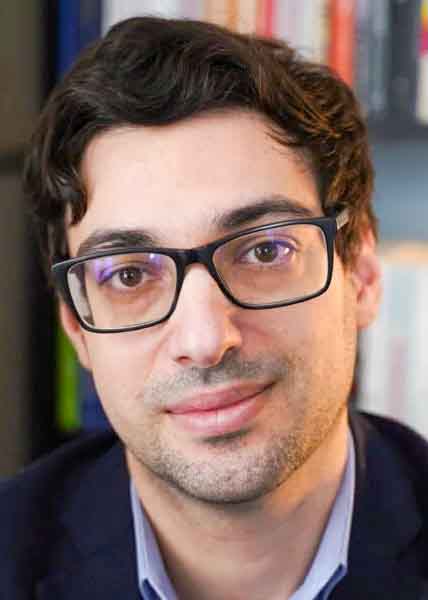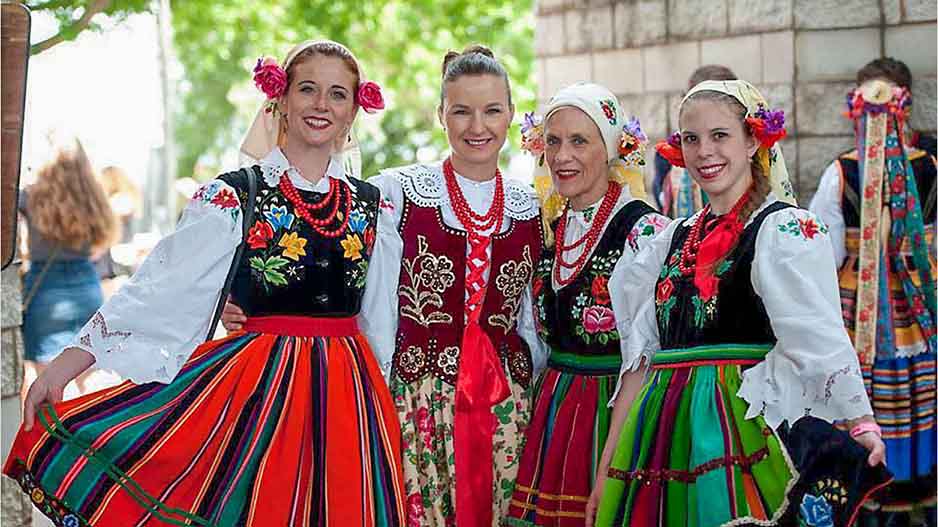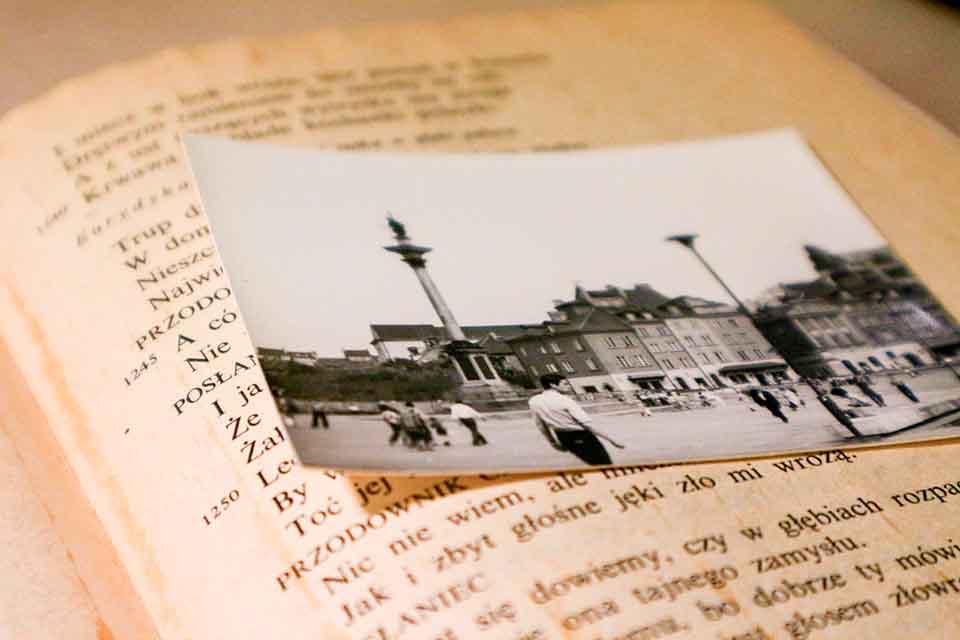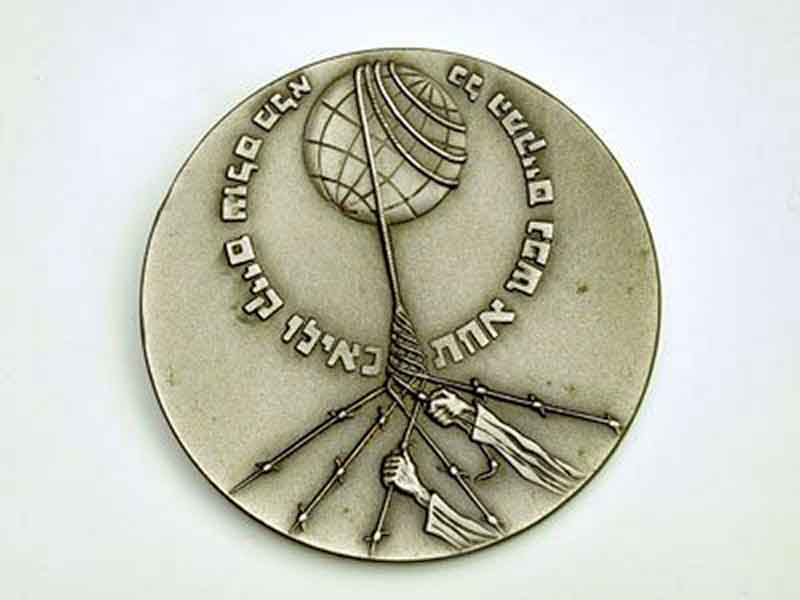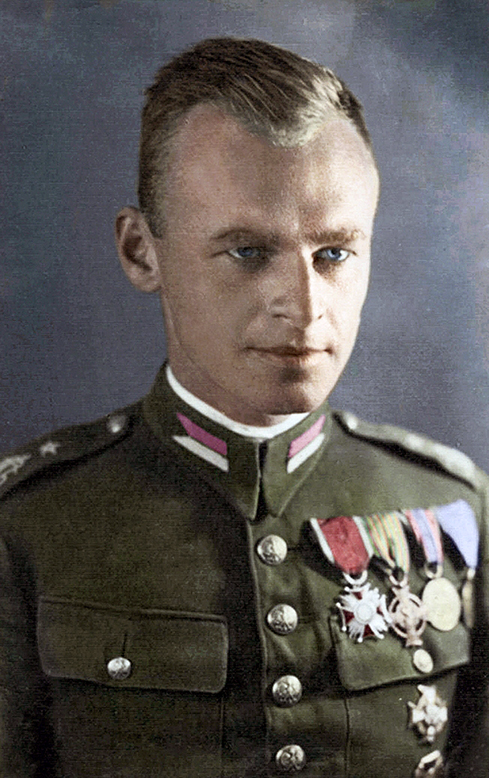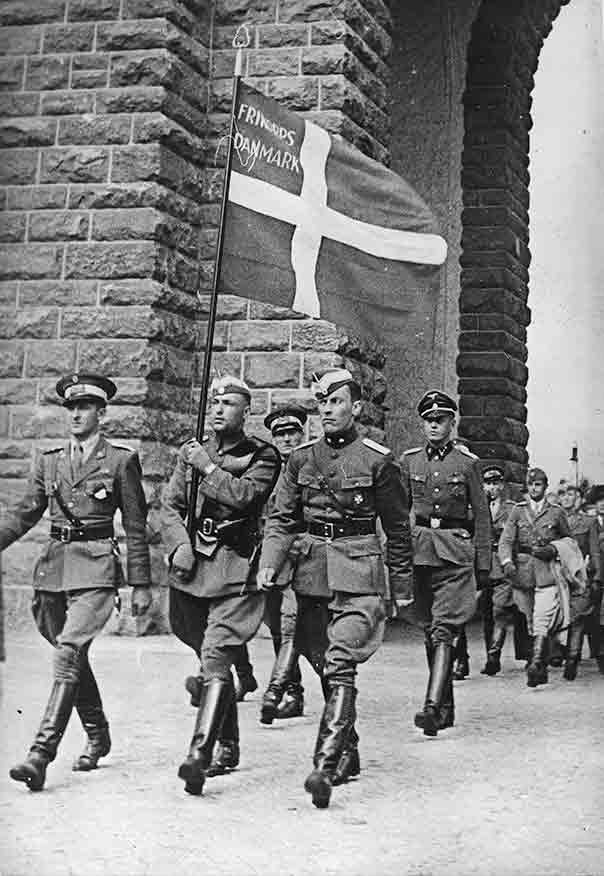This is one of the unwarranted allegations boomeranging back in Western public opinion. Poland and Poles are accused of complicity with Germany in the Holocaust during World War II.
In private and public debates, in the statements of politicians and in texts popularizing history, it is often said and written that Poland as a state, and Poles as a nation, supported the Germans in the organization and implementation of the industrial and systematic genocide against the Jews in Poland. This opinion is widespread in many countries of the Western world — in France, the United States, Germany, Israel.
The study of the complex relations between Jews and Poles in that period lacks an analysis of their broader context.
In 1939, Jews made up 10 percent of the population of the Second Polish Republic (i.e. 3.5 million people), which was the highest percentage among all European countries. This resulted from the centuries-old policy of hospitality and tolerance, which made Poland one of the main centers of the Jewish world. And even if during the struggle for independence in 1918–1921, and after the death of Józef Piłsudski in 1935, there were anti-Semitic incidents, the situation of Polish Jews was better than that of their brethren in Germany or the Soviet Union. Unlike other Central European countries, the large Jewish community was not concentrated in one urban centre. Although 350,000 Jews lived in Warsaw (one-third of the capital's population), large concentrations were also found in other cities. This was the case, for example, in Białystok (40 to 45 percent of all inhabitants of the city), Lublin, Łódź, Radom, Lviv and Vilnius. Many Jews also lived in smaller towns and villages, especially in eastern Poland (villages with a majority of Jews were called shtetls). There were also many cities where Jews lived next to other nationalities (Poles, Lithuanians, Belarusians, Ukrainians). Due to the very long presence in Poland and the centuries-old policy of tolerance, the Jewish population in Poland was dispersed and relatively poorly assimilated. This fact prevented a massive rescue of Jews, as was the case in Denmark. Nevertheless, Poland had a very rich Jewish cultural and religious life, many significant political parties, sports associations, theaters and dozens of newspapers were published.
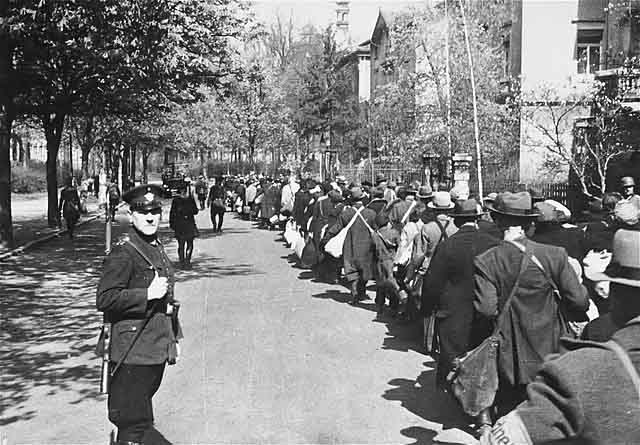
Deportation of Jews from Würzburg, Germany, to the Lublin District of the General Government, April 25, 1942. (Source: Wikipedia)
Unlike most Central and Eastern European countries, Poland refused any alliance with Hitler; an alliance that was very unlikely anyway due to the fact that Poland was the first target of conquest. Poland was also threatened by the Stalinist USSR. Both of these great dictatorships intended to take revenge for the defeats of 1918 and 1921, and it was natural for them to set aside their ideological rivalry to plan a new partition of Poland.
This is how the aggression against Poland came about – first by Nazi Germany, on September 1, 1939, and two weeks later by the Soviet Union. The allies immediately implemented a policy of cruel occupation. In the years 1939–1941, the Soviets conducted a ruthless hunt for representatives of the Polish elite, described as enemies of the revolution. Intellectuals, artists, officers, "bourgeoisie", merchants, representatives of religious cults, resistance fighters, patriots, Zionists, etc. were murdered (Katyn) or transported to Siberian gulags. Like many others, many Jewish communist fighters joined the ranks of Soviet militias in the occupied territories, which was a pretext for spreading by the Germans, but also by the Soviets, the myth of Judeo-Bolshevism. This conviction would underlie the "white terror" in eastern Poland during Operation Barbarossa in the summer of 1941.
Since Poland was neither allied with Germany nor perceived by them as a country to be "spared", the Nazis began a total occupation, without the participation of local nationalist organizations or collaborators. They maintained a modest "blue police", into which they were recruiting by force. Its job was to keep order. They also allowed the lowest levels of communal administration (mayors) to operate, but the functioning of the country as such was under their full control. The entire economy was converted to meet the needs of Germany, factory equipment was transported to the Reich, crops and livestock were requisitioned. In this country with a high percentage of the rural population (only 30% of the population lived in cities), hunger and poverty quickly set in. In addition, there was looting, destruction of property and numerous crimes committed by German soldiers. The Germans also persecuted the country's elite, deporting and murdering university professors, lawyers, politicians...
The genocidal hatred of the Germans, however, was aimed primarily at the Jews. In most towns where Jews lived, the Germans established ghettos. From the moment of the invasion of the USSR in June 1941, they proceeded to directly exterminate the Jewish population in the conquered territories ("Holocaust by bullets"). In Poland, unlike the Baltic states and Ukraine, there were no local nationalist organizations that helped the Germans in their crimes. No political party, no prominent Polish personality collaborated with the occupier. There were nationalist and anti-Semitic resistance organizations that could commit crimes against Jews, such as the National Armed Forces or some Home Army battalions, but they never allied themselves with the Germans.
From 1942, as part of the "Final Solution" plan, the Germans deported Jews from the ghettos to extermination camps. Also in the case of these mass deportations, and later crimes on an unprecedented scale, it was done without Poland's participation, which cannot be said about the collaborationist government of French Philippe Pétain, Slovakian Jozef Tiso, or Norwegian Vidkun Quisling.
It is worth remembering that the Polish government never stopped opposing the Germans and fought until the end of the war. It refused to cooperate with the Germans and repeatedly called for the protection of Polish Jews. The Polish resistance movement, one of the most powerful in Europe, executed collaborators and helped save Jews through underground networks such as "Żegota" or by producing false passports. Members of the resistance movement (Jan Karski, Witold Pilecki, etc.) made reports about the genocide against Jews and tried to alarm the governments of Western countries.
Unlike most countries allied with Hitler or occupied by Germany, Poland was the only one in which no institution or social or political organization cooperated in creating the German industrial extermination machine.
As for the civilian population, the situation was very complicated and cannot be separated from the context of the era. As mentioned above, the German occupation was particularly brutal. Of course, the Jews were the first target, but the Polish population also suffered greatly from German crimes and racism. Polish lands were to be emptied of local population and then colonized by Aryan Germans. A small number of Poles were to survive to serve as a labor force under slave labor conditions. No other country in Europe experienced such a fierce occupation, with the exception of the USSR, but there it lasted much shorter.
Due to the large number of Jews scattered throughout Poland and the lack of organized collaboration on the part of the local population, the Germans decided to punish with death anyone who hid Jews or provided them with any help. It was one of the strictest laws in all of occupied Europe. The Germans' threats were followed by their actions. A family caught hiding Jews was murdered, including women and children. Entire villages and their inhabitants were often razed to the ground. Farm animals were killed, crops were burned or confiscated. The Germans hoped that, thanks to their criminal policy, they would trigger a reflex of collaboration or even induce Poles to murder Jewish refugees or resistance fighters. They played on a certain rift in human psychology: in a situation of extreme poverty and a threat to the life of themselves and their families, people begin to compromise with concepts such as goodness and morality. Some choose to be martyred for their beliefs, but most, generally, do not. Therefore, it is unfair to demand heroic behavior from individuals who are mired in poverty or who live under the permanent threat of death.
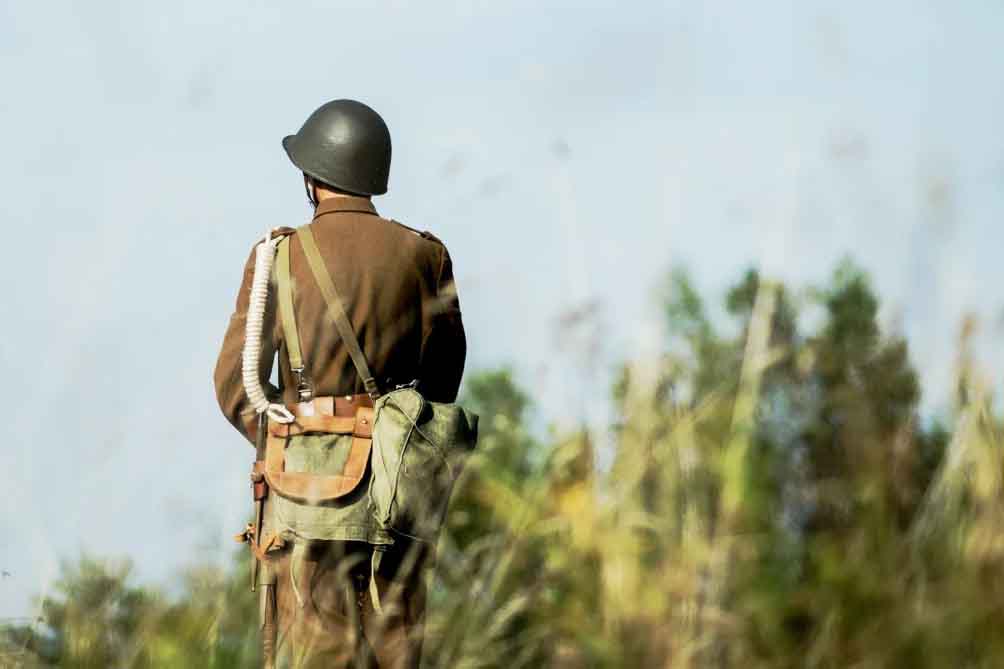
A member of a reenactment group recreating the events of World War II in Poland. PHOTO: Daniel Dmitriew / Forum (Source: DlaPolonij.pl)
The Germans were able to take advantage of this situation and recruited Polish peasants to hunt Jews. Some did it in the face of a threat to their lives or in order to improve their living conditions, others for anti-Semitic reasons. It should be noted that the method used by the Germans in Poland was not widespread in other countries of Central and Western Europe. In those countries, Jewish communities were small, located only in one or a few large cities, and the local administration - either puppet, or genuinely cooperating - was responsible for drawing up lists of the Jewish population and their deportation. It happened that nationalist militias took an active part in massacres and deportations, as in Croatia (Ustaše), Serbia, Romania, Hungary (arrow crosses), Ukraine and the Baltic states.
Special situations occurred in the summer of 1941 in eastern Poland during Hitler's invasion of these areas. As I have already written, the Soviet occupation was brutal and bloody. Ethnic minorities and local communist activists sometimes collaborated with the Soviet authorities in committing crimes. Knowing this, Reinhard Heydrich, director of the Reich Central Security Office and architect of the "Final Solution of the Jewish Question", already in April of this year, issued an order ordering German troops to target communists and Jews and to use anti-communist sentiments of the population who were victims of the Soviet occupation to attack them. Thus, the German authorities spread the myth of Judeo-Bolshevism, giving the local population a free hand to murder. The most famous example of atrocities committed at that time and in this context by the local population against Jews was the pogrom in Lwów. In Poland, several events can be identified with pogroms, for example those that took place in small villages in the Bialystok region: Jedwabne, Radziłów, Szczuczyn, and Wąsosz. In all these cases of crimes against Jews committed by Poles, we can talk about the assistance, instigation and consent of German soldiers or special operational groups (the so-called Einsatzgruppen).
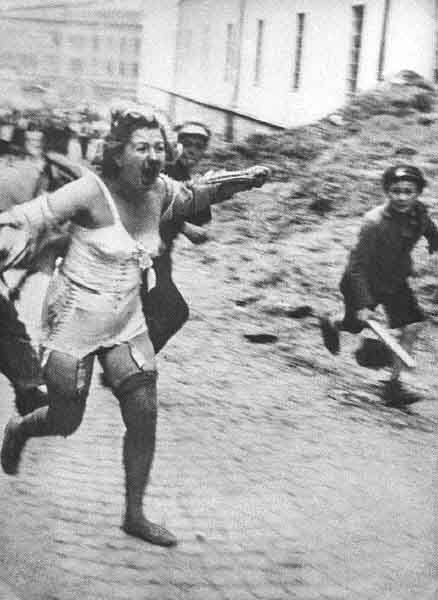
A Jewish woman chased by a Ukrainian mob during a pogrom in Lviv. Yad Vashem photo collection, 80DO2. At least 3,000 Jews were killed during the Lviv pogroms in 1941, mostly by local Ukrainians. (Source: Wikipedia)
All in all, events of this type were marginal in Poland. In contrast to the Baltic states and Ukraine, where the Germans could count on local collaborationist organizations (the Arajs commando in Latvia, the OUN in Ukraine), the Poles did not form collaborationist militias and remained hostile to the occupier. It was quite the opposite: in Poland, state-owned and independent organizations and networks to help Jews were established. One of the distinguished people in this field was Irena Sendler, who saved 2,500 Jewish children from the Warsaw ghetto. Therefore, it can be stated with full force that Poland as a country not only did not participate in the Holocaust, but also contributed to saving Jews, which cannot be said about many other European countries.
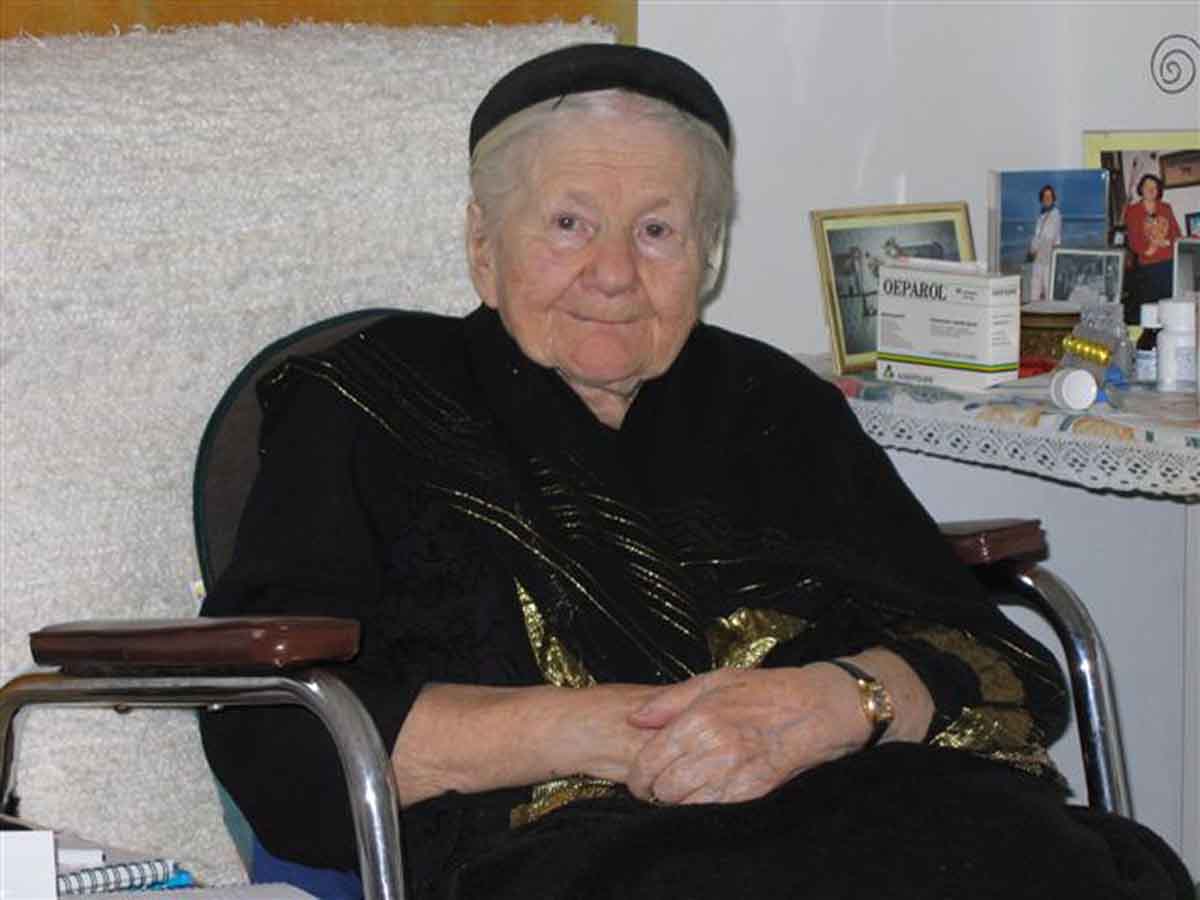
Irena Sendler in 2005 (Source: Wikipedia)
The Jews were not without reason afraid of denunciations, which were always and everywhere possible, regardless of whether their authors acted out of base motives, out of hatred, or under the threat of the Germans. Survivors retained this fear of neighbor denunciation because it was related to fear of the unknown. The German uniform was identified as a visible and obvious threat, but a denunciation from a Pole could not be predicted. So the Jews had to be vigilant at all times. This natural trauma and personal, individual testimonies were manipulated after the war by dishonest historians or sociologists in order to create a false picture of the general situation of Jews under the German occupation of Poland. The more so that even if we can talk about denunciations and crimes committed by Poles, they were ultimately few and never on a scale similar to other countries. The vast majority of Polish Jews were exterminated without Poland's participation in German ghettos and camps.
It is impossible to precisely determine how many Jews died at the hands of Poles or were denounced by them to the German authorities. It is also impossible to say how many Jews the Poles helped by hiding them or saving their lives in any other way. In order to successfully hide one or more Jews, the tacit kindness of the entire neighborhood or the entire village was very often needed. Dozens of people may have been involved in supporting the escapees, both directly and indirectly, by keeping the fact of helping a secret. It only takes the betrayal of one person for the whole plan to collapse, and to put the lives of all those involved in danger. Today ,it is much easier to count denunciations than gestures of support. It is easier to remember those who report edthan those who helped. The same applies to the attitude of the Polish Catholic Church. Some clergymen were, of course, openly anti-Semitic, but others hid Jews in their churches or became involved in the activities of underground humanitarian organizations. Many monasteries opened their doors to shelter Jews. One cannot generalize because the Church is not a monolithic bloc.
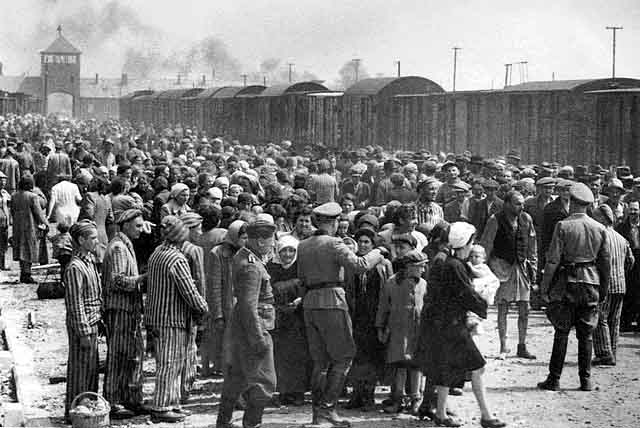
"Selection" of Hungarian Jews on the ramp at Auschwitz II-Birkenau in German-occupied Poland, around May 1944. Jews were sent either to work or to the gas chamber. (Source: Wikipedia)
Here are some elements of the response to the false accusations of Poles' complicity in the German extermination machine. They are committed by dishonest and politicized historians who have found a niche for themselves and with the help of progressive media are building their recognition in the world. To this should be added the effects of the communist propaganda of the post-war period, the aim of which was to worsen the image of Poland as a "reactionary country and an enemy of the revolution". Russia still uses this propaganda to this day, making Poles "fascists" and manipulating the German-Soviet pact. As for the Germans, they try their best to blame their crimes on the occupied countries and their people. Chancellor Olaf Scholz recently declared that Germany was "occupied by the Nazis".
Unfortunately, Western countries are dominated by a blatant lack of knowledge about the reality of the brutal occupation of Poland, and the belief that hiding Jews in Poland was as easy as in countries where the occupation was less severe. This lack of knowledge and anti-Polish propaganda are unfortunately firmly embedded in public opinion around the world, also in Israel. Some commentators and politicians there believe that Poland wants to manipulate history to whitewash itself. They believe that if some Poles committed anti-Semitic crimes, the whole nation must bear the responsibility, and the state should take responsibility for it — even though it did not cooperate with the Germans, and even did everything in its power to save Jews. And even though it has expressed an official apology for these crimes. Some Jewish circles fear that Poland is trying to question the uniqueness of the Jewish experience of the Holocaust in order to highlight the suffering of the Polish people. These sufferings, however, are very real and testify to the genocidal projects of the Germans against the Poles, which were to be implemented after the end of the extermination of the Jews. The truth is that the Polish authorities recognize the specific nature of the Holocaust, just as they admit that some Poles were complicit in crimes against Jews (which can neither be forgiven nor justified).
The myth about the active and massive participation of Poland and Poles in the Holocaust should be treated in the same way as the myth about Judeo-Bolshevism — as a manipulation aimed at shifting responsibility for crimes onto someone else. Undoubtedly, there were Polish and Jewish criminals in the communist totalitarian apparatus, but in small numbers and in a disorganized and irregular manner. On the basis of unrepresentative, individual examples — put together unconsciously or with ill will — specific narratives were created to serve those who have an interest in them. This is an old and apparently effective propaganda technique.
Jews and Poles must fight these lies and stereotypes together, because both nations, which have been very close to each other for centuries and love the search for truth, must know that their reconciliation will take place thanks to mutual understanding and historical sensitivity.
Translation from Polish by Andrew Woźniewicz.



